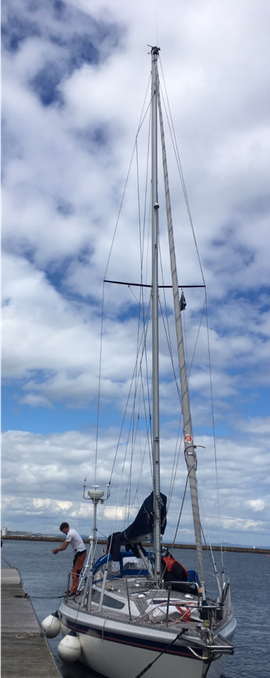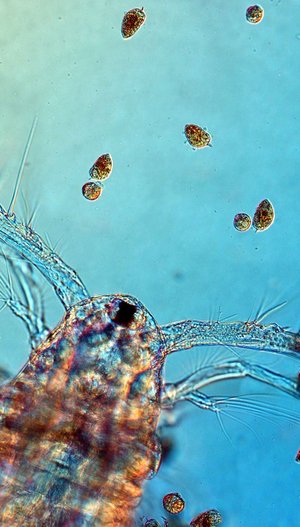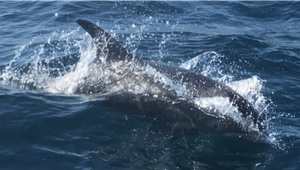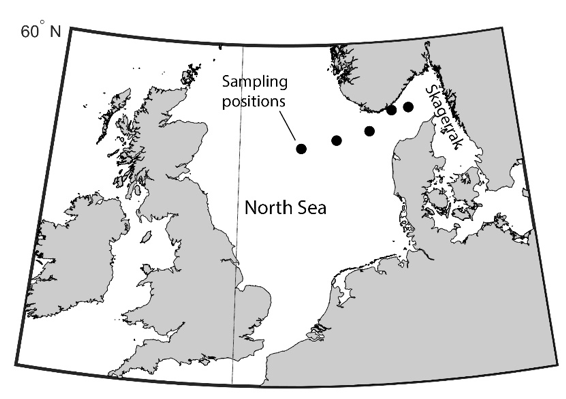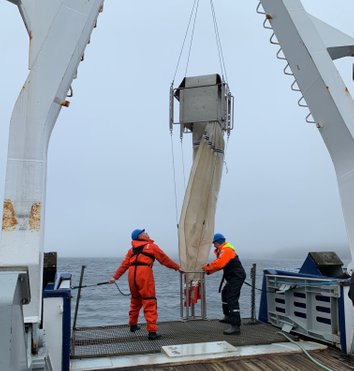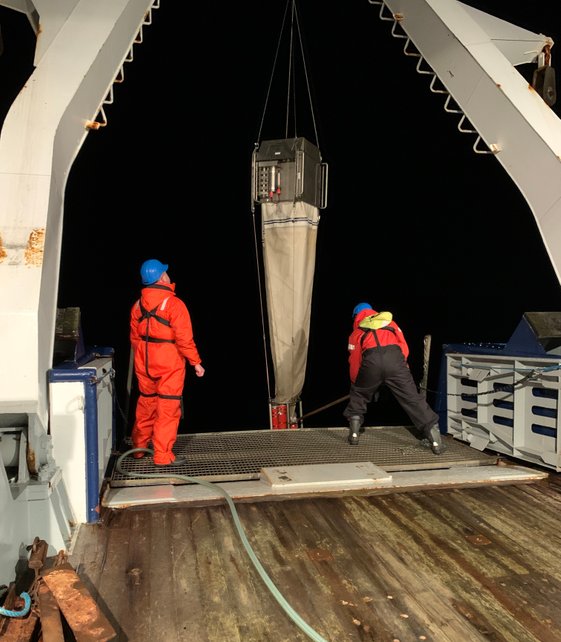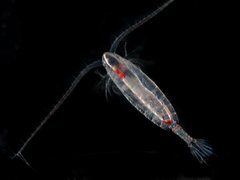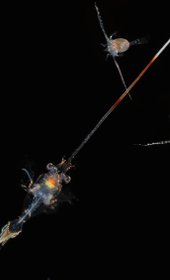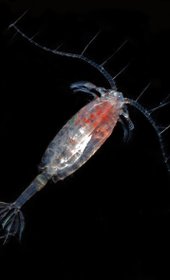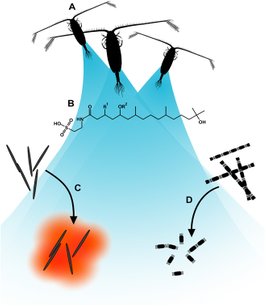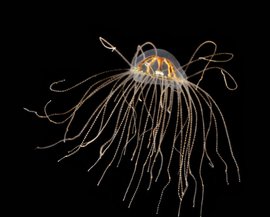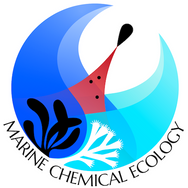ABOUT US
Most pelagic organisms rely on chemical stimuli to communicate and perceive their surroundings. This chemical “language” is largely unknown.
We target the individual signaling compounds and translate their function in the pelagic ecosystem.
RESEARCH
We perform hypothesis driven research in pelagic chemical ecology. We isolate and identify signal molecules, explore how they are transmitted, what effect they have in the responding organisms and in the pelagic ecosystem.
The group is multidisciplinary, chemists and biologists work together on the same research questions.
Check out our latest low emission sampling efforts on board S/Y TOYA from Sweden to Scotland
Diurnal migration sampling with RV Skaggerak
Our most recent field trip involved a 24 hour sampling of the vertical migration pattern of copepods in Gullmarsfjorden just north of Gothenburg. Zooplankton samples and copepodamide concentrations are one part of master student Henrik Möllers thesis work.
LATEST NEWS
January 2024
Sinas and Milads paper on freshwater copepodamides published
September 2023
Harshith presents Holographic microscope in Lund see the talk
August 2023
Come work with us, we are recruiting a PhD student. Read more and apply
June 2023
Milad and Erik presents at ASLO
December 2022
New publication:
Single-shot self-supervised object detection in microscopy Nature Communications
November 2022
New publication in eLife and a press release from the faculty of Science. Holographic microscopy provides insights into the life of microplankton
July 2022
Kristie presents at. the e-ICOC conference on her PhD work involving copepodamides.
June 2022
Check out our two new popular science articles in Havsutsikt.(in Swedish) here and here.
May 2022
Visit to Nantes, France to test copepodamides on Dinophysis
April 2022
New publication from Kristie Rigby's PhD thesis:
and also a successful PhD defence by Kristie Rigby.
March 2022
Upcoming PhD defence 1st April by Kristie Rigby, her thesis can be found here
February 2022
New preprint with our collaborators over in the physics department. Microplankton life histories revealed by holographic microscopy and deep learning
Preprint: arXiv:2202.09046 [physics.bio-ph]
December 2021
New content on our YouTube channel check out our latest video on how to extract and purify copepodmides.
November 2021
Our 2 PhD students in the group, Kristie and Milad gave talks at the 9th Nordic Marine Phytoplankton workshop 25-26th November 2021.
October 2021
Congratulations to Fredrik Ryderheim on successfully defending his PhD thesis
"Opening the black box on predator-induced phytoplankton defenses: mechanisms, traits, and trade-offs”.
`September 2021
We hosted the Marine Chemical Ecology course with 20 students from 10 different countries.
July 2021
New publication in Limnology and Oceanography.
Eavesdropping on plankton—can zooplankton monitoring improve
forecasting of biotoxins from harmful algae blooms?
New open access publication in Ecology and Evolution.
Predatory cues drive colony size reduction in marine diatoms.
May 2021
PhD course in Marine Chemical Ecology 20-25th September at Tjärnö Marine Laboratory on the Swedish West coast. Hosted by University of Gothenburg
March 2021
New publication:
Wrasse fishery on the Swedish West Coast: towards ecosystem-based management
February 2021
New publication:
"Predator-induced defence in a dinoflagellate generates benefits
without direct costs" ISME
https://doi.org/10.1038/s41396-021-00908-y
We are hosting the Marine Microbial Chemical Communcation Webinar series
(M2C2 webinar) 5th May.
January 2021
New publication:
"Predator Chemical Cue Effects on the Diel Feeding Behaviour of Marine Protists"
DOI: 10.1007/s00248-020-01665-9
December 2020
New paper accepted:
"Wrasse fishery on the Swedish west coast: towards ecosystem-based management" ICES J of Marine Science
November 2020
Erik gives at talk at the NOMP conference (Nordic Marine Phytoplankton) "Can we use zooplankton to improve forecasting of harmful algal blooms?"
October 2020
We welcome Milad Pourdanandeh new PhD student in the group
May 2020
Erik gives a talk at University of Texas Marine Science Institute in the Schweppe Endowed Lecture series
Copepodamides now in compulsory school biology book :-)
https://www.nok.se/titlar/laromedel-b1/puls-no-ak-4/
April 2020
New publication in Fluids:
Chemical Signaling in the Turbulent Ocean—Hide and Seek at the Kolmogorov Scale
https://www.mdpi.com/2311-5521/5/2/54
February 2020
MARICE workshop on Tjärnö on the effect of ocean acidification plankton signallling
December 2019
Fredrik and Josephine visits from DTU Aqua to purify copepodamides.
Marine Chemical Group at GU has a new logo
November 2019
-New publication in Frontiers in Ecology.
Using chemical language to shape future marine health.
October 2019
- Christina Karliczek Skoglund visits the lab to film Calanus copepods for the upcoming film "Cold Sharks"
September 2019
-SCOR WG157 MetaZooGene 2019 Annual Meeting at the GGBC hosted by University of Gothenburg with focus on
Rediscovering pelagic biodiversity:
Progress, promise, and challenges of metabarcoding of microbes to mammals.
- Erik presents copepodamides at the Marine Biotechnology conference organised by Maritime cluster of West Sweden.
https://www.maritimaklustret.se/kalender/marine-biotechnology-conference-2019/
August 2019
- New popular science article on our latest publication in The Economist. "The bioluminescence people find so attractive is a defence mechanism".
MEDIA
A selection of photos and films documenting our work and findings with pelagic organisms.
Much of our work involves image and film analysis to better understand the behavioural response to chemical stimulae of the organims we study. Here we present our best photos and film, showcasing the beauty and complexity of this poorly understood ecosystem.
PUBLICATIONS
We regularly publish our findings in a variety of journals. The links to the right will take you to an external open access page where you can read the relevant article.
We primarily publish our findings through journals with a focus/interest in chemical ecology, microbiology and molecular biology.
Species Specific Responses to Grazer Cues and Acidification in Phytoplankton- Winners and Losers in a Changing World
Frontiers in Marine Science: April 2022
Eavesdropping on plankton—can zooplankton monitoring improve forecasting of biotoxins from harmful algae blooms?
Limnology and Oceanography: July 2021
Predatory cues drive colony size reduction in marine diatoms
Ecology and Evolution: July 2021
Predator Chemical Cue Effects on the Diel Feeding Behaviour of Marine Protists
Microbial Ecology: January 2021
Using chemical language to shape future marine health
Frontiers in Ecology and the Environment : October 2019
Copepods drive large-scale trait-mediated effects in marine plankton
Science Advances : February 2019
Grazer-induced transcriptomic and metabolomic response of the chain-forming diatom Skeletonema marinoi
The ISME Journal :March 2018
Induction of domoic acid production in diatoms—Types of grazers and diatoms are important
Harmful Algae: July 2018
Effects of predator lipids on dinoflagellate defence mechanisms - increased bioluminescence capacity
Nature Scientific Reports: October 2017
ARCHIVES
June 2019
-INSIGHT: Stories from the sea. Read about our recent low carbon emission expedition sampling for copepodamides on board S/Y TOYA.
-New publication out in Current Biology.
Grazer-induced bioluminescence gives dinoflagellates a competitive edge.
-Congratulations to Aubrey Trapp our masters student who sucessfully defended her thesis!
May 2019
Interview with "Naturmorgon" from the Swedish public service radio (P1) on the effect of copepodamides in the ocean. Click here to listen (in Swedish)
-New publication in PeerJ on the highly toxic clinging jellyfish popping up along the Swedish west coast.
-Check out the news coverage on the clinging jellyfish:
Woods Hole Oceanographic Institution,
March 2019
-New publication in Science Advances.
Copepods drive large-scale trait-mediated effects in marine plankton.
-Popular science articles can be found in Science Daily and by Göteborgs Posten (our local paper in Swedish)
We welcome Anna Arias from University of Barcelona as a visiting PhD Student. Anna will be with us for 2 months investigating diurnal rhythms and copepodamides.
Congratulations to our Masters student Maja Karlsson who successfully defended her thesis!









